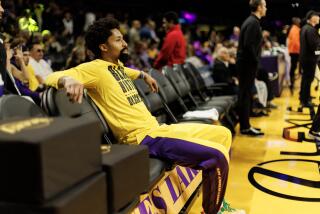No ruling as Civic hybrid owner takes Honda to Small Claims Court
It was Honda Motor Co. versus the little guy Tuesday, as a lone Civic hybrid owner faced off against the automaker in Small Claims Court in Torrance.
Heather Peters, a 46-year-old Los Angeles resident, took the unusual tactic after learning of a proposed class-action lawsuit settlement that covered her 2006 vehicle. That settlement, over the Civic hybrid’s worse-than-advertised fuel economy, would give trial lawyers $8.5 million while Civic hybrid owners would get as little as $100 and rebate coupons for the purchase of a new car.
Peters opted out of the class action and instead filed suit in Small Claims Court, where California law prohibits defendants like Honda from bringing attorneys. On Tuesday, she asked Los Angeles Superior Court Commissioner Douglas G. Carnahan to award her the maximum of $10,000 to compensate her for spending significantly more on gasoline than she had expected.
It was an atypical small-claims trial from the start. Peters, a former attorney, drove her bronze-colored Civic hybrid to the courthouse and held a news conference in the parking lot before the trial started.
An overflow crowd of reporters, photographers and camera crews packed the tiny courtroom along with Peters, her witnesses, Honda’s representatives, curious Civic hybrid owners and dozens of other plaintiffs and defendants in unrelated cases.
After reassigning several of the other cases to other departments, Carnahan spent the bulk of his time on the Honda matter. He didn’t issue a ruling Tuesday, saying that he would review the case and mail his decision.
Armed with a stack of documents, photos of her dashboard and Honda brochures, Peters said Honda advertised that the car would get about 50 miles per gallon, but “the car never got more than 41 or 42 even on its very best day.” She said the fuel economy dropped below 30 mpg after a software update that was intended to prolong the life of the car’s battery and improve performance.
When asked by Carnahan why she decided to pursue her case in Small Claims Court, she responded: “I don’t have the time, energy and inclination to go to regular court and get beat up by Honda’s lawyers.”
Neil Schmidt, a technical specialist from Honda who served as the automaker’s representative, called Peters’ $10,000 claim “ridiculous” and said the fuel economy numbers were done by independent testing.
“We have no choice; we have to put these numbers on the label,” said Schmidt, who disputed Peters’ claim that the car’s battery and software updates were dragging down its fuel economy. “The biggest effect is how you drive.”
After the trial, American Honda Motor Co. spokesman Chris Martin said in a statement that Peters never contacted Honda to complain about her car’s fuel economy until November. After she filed suit against Honda, the company “immediately offered to inspect her vehicle and work with her on the findings, but those offers were rejected.”
“We do not believe Ms. Peters was deceived,” Martin said.
If she’s successful, Peters could win damages many times the payment she would derive from the class-action lawsuit settlement. But Honda could appeal the ruling in Los Angeles Superior Court, where the automaker would be allowed to bring in its army of lawyers to overturn any small-claims judgment.
The case has garnered national attention, with legal experts saying the approach could spawn a new litigation strategy in the auto industry and other businesses. But some said they were skeptical that Peters’ maverick strategy would pay off or gain traction among other Civic owners.
“All the time and effort and energy that that takes seems not likely to me to gain a lot of momentum,” said Aaron Jacoby, a Los Angeles defense attorney who heads the automotive industry group at the Arent Fox law firm. “To bring action, you have to be willing to do a lot of work, like she did.”
Peters, a state employee who let her law license expire a decade ago, launched the DontSettleWithHonda.org website and a DontSettleWithHonda Twitter account to urge Honda owners across the country to follow her example.
Honda sold about 200,000 of the hybrids over a six-year period, and because of resales, as many as 500,000 people are eligible to file claims against the automaker.
The class-action suit stemmed from problems with the Civic hybrid’s fuel economy. Honda advertised that the hybrid would get about 50 mpg, but many consumers complained that it only gets around 30 mpg. Owners also blamed the vehicle’s battery, which can die years earlier than expected, and said software fixes implemented by Honda only made the problem worse.
Meanwhile, a judge in San Diego County Superior Court is expected to decide whether to accept the class-action settlement March 16. Claimants have until Feb. 11 to opt out of the class.
More to Read
Inside the business of entertainment
The Wide Shot brings you news, analysis and insights on everything from streaming wars to production — and what it all means for the future.
You may occasionally receive promotional content from the Los Angeles Times.









